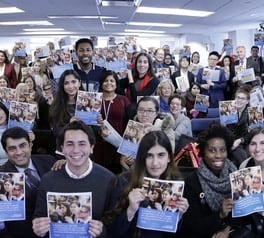Description
An Introduction to CEDAW

Learning Modality: Self-paced
Date: Available online all year
Duration: Approximately 5 hours for the 5 modules required to receive the course certificate.
Language: English and French
Tuition fee: Free
Modalité d’apprentissage : En autonomie
Date : Disponible en ligne toute l’année
Durée : Environ 5 heures pour les 5 modules qui sont requis afin d’obtenir le certificat du cours.
Langue : Anglais et Francais
Coût : Gratuit
{%: Objectives Objetivos Objectifs}
The objective of this course is to enhance the capacity of UN programme staff at national, regional and global offices, to support the implementation of CEDAW by national counterparts via:
- Increased knowledge about CEDAW, including its core principles, core obligations of States parties to CEDAW, the reporting cycle, domestication of CEDAW at national level, and the use of the optional protocol to CEDAW.
- Enhanced skills to apply the substantive framework of CEDAW in legislative, policy and institutional analysis and incorporate CEDAW in programming and policy advocacy work.
- Strengthened awareness of women’s rights violations and gender inequality and strengthened commitment to promote women’s human rights and gender equality.
L’objectif de ce cours est de renforcer les capacités du personnel programmatique des Nation Unies, aux niveaux national, régional et global, pour exercer son rôle d’appui aux partenaires nationaux dans la mise en œuvre de la CEDEF. Le cours vise à :
- Renforcer les connaissances sur la CEDEF, ses principes, les obligations des Etats signataires, le cycle des rapports, l’adaptation de la CEDEF au niveau national, et l’usage du protocole optionnel.
- Orienter pour appliquer le cadre conceptuel de la CEDEF dans les analyses des législations, politiques publiques, et institutions, et pour incorporer la CEDEF dans la programmation et le travail de plaidoyer.
- Sensibiliser sur les violations des droits des femmes et les inégalités de genre et appeler à davantage d’engagement envers les droits des femmes et l’égalité de genre.
{%} {%: Modules Módulos Modules}
- An introduction to CEDAW: A dynamic human rights instrument for addressing discrimination against women
- Key principles and Core Obligations
- Domestic application of CEDAW
- Reporting to the CEDAW Committee
- What is the Optional Protocol of CEDAW?
- Introduction : un instrument de droits humains dynamique pour lutter contre les discrimination envers les femmes
- Principes et obligations clés
- Application nationale de la CEDEF
- Rapports au Comité de la CEDEF
- Utiliser le Protocole facultatif de la CEDEF
{%} {%: Audience Audiencia Public}
The primary audience of this course are UN programme staff at national, regional and global offices. The secondary audience entails senior officers at UN national, regional and global offices, government officials and civil society
Ce cours s’adresse en premier lieu au personnel programmatique des Nations Unies aux niveaux national, régional et global. Il peut également être utile pour le personnel senior et pour les fonctionnaires gouvernementaux et la société civile.
{%}

